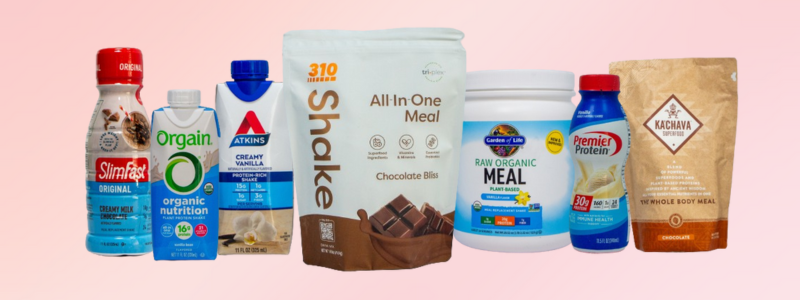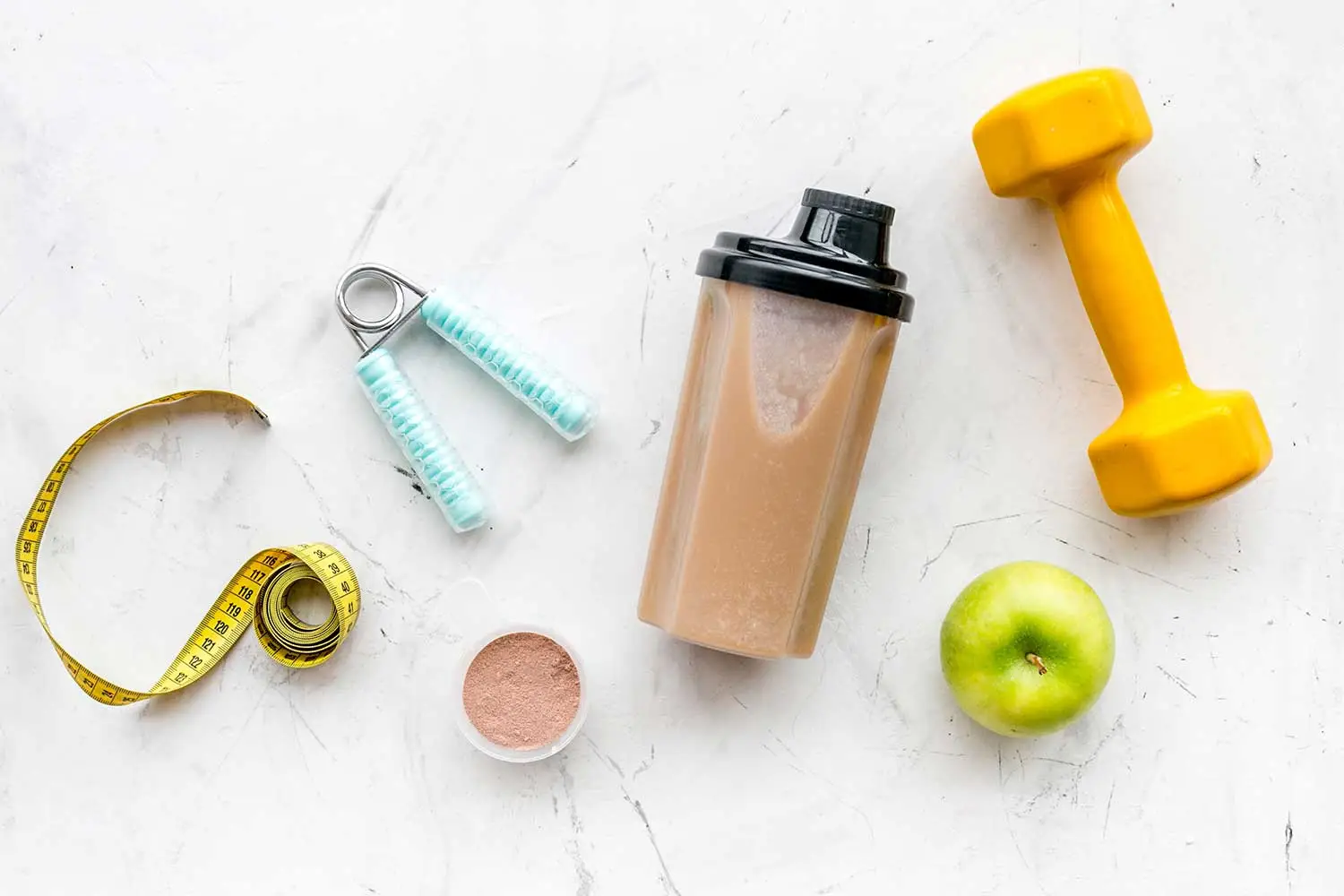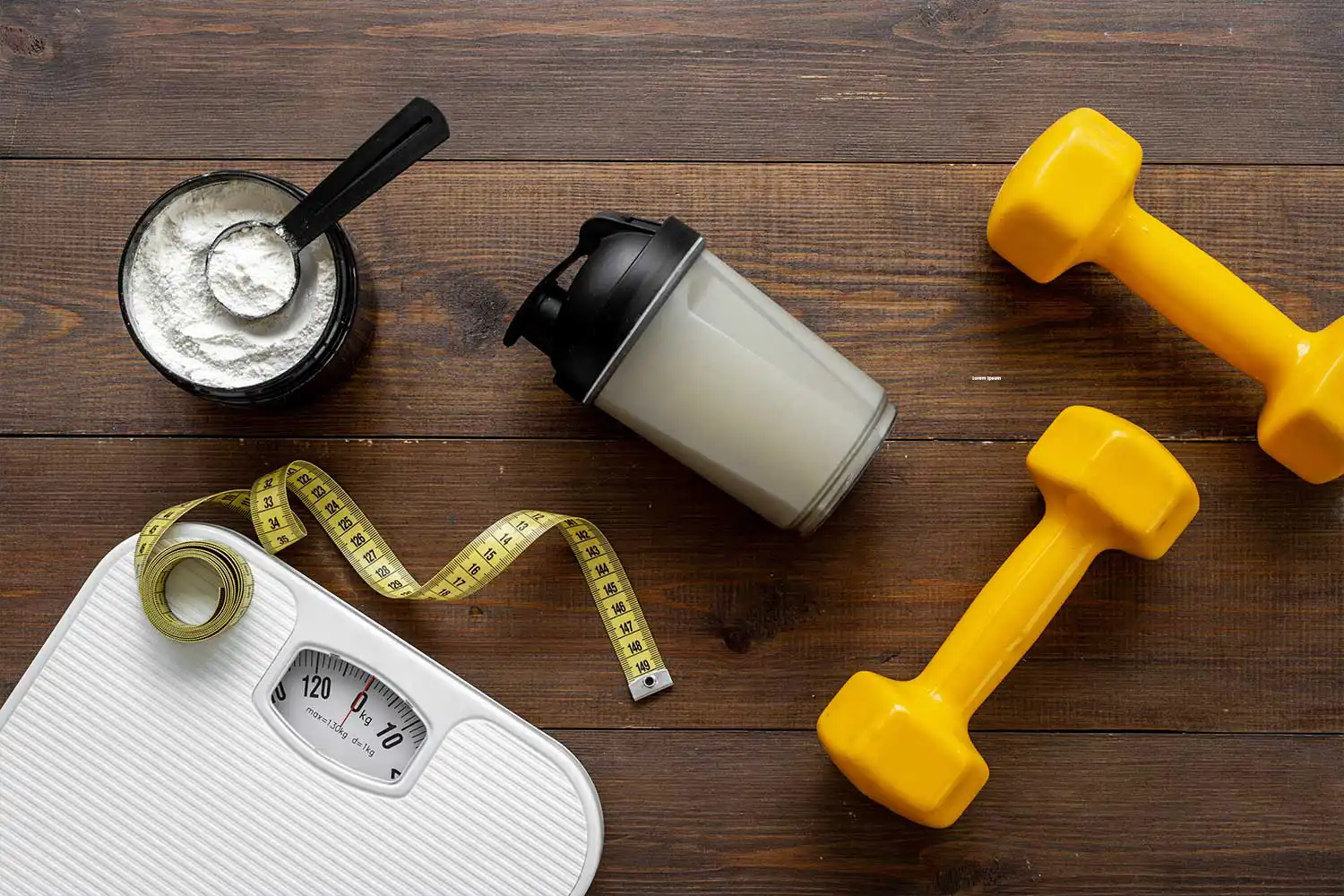We know you’ve been there (because we have to!). You’ve...
In today’s fast-paced world, we’re all about convenience, especially our meals. Enter meal replacement shakes – quick and easy nutrition when time is tight. But what exactly are these shakes, and how do they work? In this guide, we’re delving deep into what meal replacement shakes are,covering everything from their nutritional properties to their benefits and potential downsides. So, let’s jump in.
What Are Meal Replacement Shakes: An Overview
Meal replacement shakes are custom-made drinks jam-packed with essential nutrients like proteins, carbs, fats, vitamins, and minerals. People usually have them instead of a regular meal, making it convenient for those with busy schedules or watching their calorie intake. These shakes come in ready-to-drink bottles, powders, and bars. You can find them in your local grocery store, health food shop, or online, making them accessible to just about everyone.
How Do Meal Replacement Shakes Work?
Meal replacement shakes work like this: they deliver a fixed number of calories and all those necessary nutrients your body needs in a single serving. The idea is to swap out one or more regular meals with these shakes. This helps you manage your calorie intake while ensuring you get all the good stuff your body craves. Most meal substitute shakes have a balanced mix of proteins, carbohydrates, fats, fiber, vitamins and minerals.
When you sip on a meal replacement shake, you get a handle on your calorie intake while ensuring your body runs like a well-oiled machine. This can be a real game-changer for weight management and an easy way to get your nutrients on the fly.
Meal Replacement Shake Nutrition Facts
It’s a common question whether meal replacement shakes are healthy, and indeed, they are designed to be a nutritional powerhouse, but what’s inside can vary between brands and products. Choosing the best meal replacement shake is essential for ensuring you get the right nutrients [1]. Here are the nutritional goodies you’ll often find:
Macronutrients: Meal substitute shakes provide a balanced mix of nutrients: around 15-30 grams of protein for muscle strength and feeling full, 30-50 grams of carbs for energy, 5-15 grams of healthy fats, and some even have fiber for digestion. It’s like a complete meal in a sip!
Vitamins and Minerals: These shakes contain essential vitamins (A, C, D, and E) and important minerals like calcium, magnesium, and potassium.
Calories: Most meal replacement shakes contain around 200 to 400 calories per serving, which helps manage weight and portion control.
Sugar Content: Be cautious of added sugars in some shakes, as they can affect blood sugar levels. Opt for options with less sugar or natural sweeteners when possible.
Special Formulas: You can find specialized meal substitute shakes to fit various dietary needs, such as low-carb, gluten-free, or vegan options. These cater to specific preferences or restrictions, making finding the right one easier.
What Are Meal Replacement Shakes Good For?
There are several benefits of meal replacement shakes, as these drinks can be a lifesaver in various situations including convenient meals, weight management, nutrient boost
Convenient Meals: Perfect for hectic schedules, they provide a quick and nutritious alternative to fast or skipped meals.
Weight Management: They help control calorie intake, aiding in weight management when used alongside a balanced diet and exercise. You can learn more about the potential for weight loss with these shakes here.
Nutrient Boost: Ensure you get essential nutrients, making up for any nutritional gaps in your diet.
Portion Control: Pre-measured servings prevent overeating and excess calorie consumption.
Post-Workout Recovery: Ideal for post-workout muscle recovery due to their protein content.
Dietary Options: Available for various dietary needs, including diabetics, gluten-free, and vegan options.
Do Meal Replacement Shakes Work for Weight Loss?
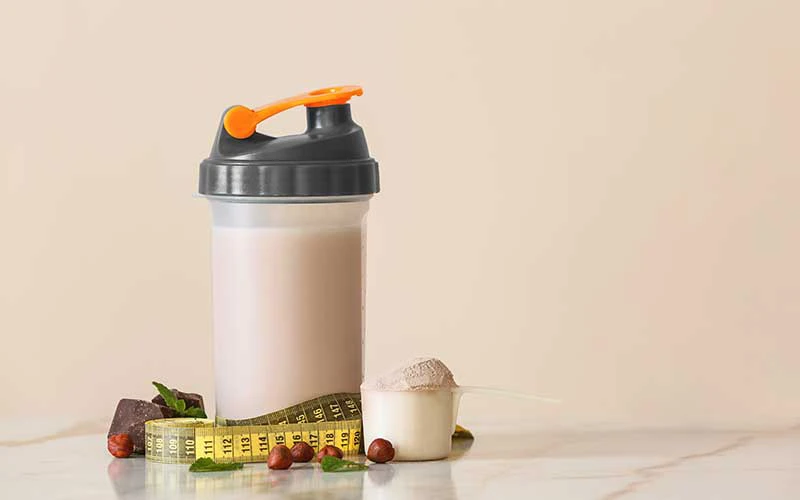
A question that’s been buzzing online more than a thousand times is, “Does meal replacement help you lose weight?” Well, the answer is Yes! Having meal replacement shakes for weight loss can be an ace up your sleeve as part of a solid weight management plan [2]. Here’s how they help you shed those extra pounds:
Calorie Command: The beauty of meal substitute drinks for weight loss is that they keep your calorie intake in check. Swapping a high-calorie meal with a lower-calorie shake creates a calorie deficit – the secret sauce for weight loss.
Portion Power: No more eyeballing portion sizes. You can have meal replacement shakes for weight loss that come in just-right servings, so there’s no chance of going overboard, a common pitfall in weight loss efforts.
Nutrient Combo: These meal replacement powders serve a balanced mix of macronutrients and vitamins. So, while cutting calories, you still get all the nutrients your body needs.
Convenience King: The convenience factor of meal replacement drinks makes it easier to stick to a weight loss plan. No need to spend hours in the kitchen – shake, sip, and you’re ready.
Structured Programs: Many weight loss programs incorporate meal substitute shakes. They provide guidance and support, making it easy for folks to reach their weight loss goals.
What Makes Meal Replacement Shakes Different from Protein Shakes?
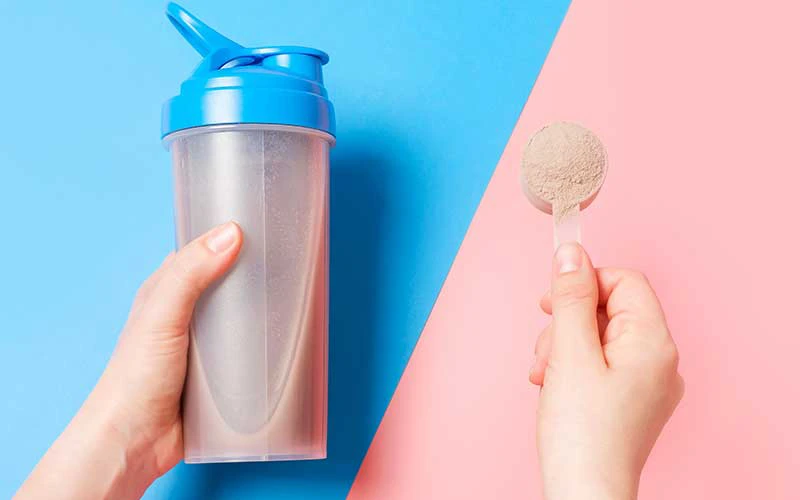
To understand the main differences between Meal Replacement Shakes and Protein Shakes, it’s important to note that meal replacement drinks replace full meals with balanced nutrition, while protein shakes focus on delivering protein and are typically used as supplements or snacks. Here is a comparative table for Meal Replacement Shakes Vs Protein Shakes for a better understanding:
| Aspect | Protein Shakes | Meal Replacement Shakes |
| Primary Purpose | Supplementing Protein Intake | Replacing Complete Meals |
| Protein Content | High (15-30 grams per serving) | Balanced (15-30 grams per serving) |
| Carbohydrate Content | Low (varies, minimal carbs) | Moderate (30-50 grams per serving) |
| Fat Content | Low (varies, minimal fats) | Moderate (5-15 grams per serving) |
| Fiber Content | Minimal (usually low in fiber) | Some include fiber for digestion |
| Calorie Range | Low to Moderate | Moderate to High |
| Typical Use | Post-workout recovery, muscle-building | Meal replacement for convenience, weight management |
| Suitable as a Meal Replacement | No, primarily a protein supplement | Yes, designed to replace full meals |
| Weight Loss Support | Limited, unless part of a calorie-controlled diet | Can support weight loss when used correctly |
| Dietary Options | Often limited to protein sources | Diverse options catering to dietary needs |
| Overall Nutrition | Focused on protein intake | Balanced with proteins, carbs, fats, and often vitamins/minerals |
How to Make a Meal Replacement Shake?
Start with around a cup of liquid: water, milk (dairy or plant-based), or juice. Next, add a source of protein, like meal replacement protein powder or yogurt, usually around 2-4 tablespoons. For an energy boost, toss in some carbohydrates, such as oats or a banana. To keep you feeling full, include healthy fats like a spoonful of nut butter. Consider using ingredients like vanilla extract, cocoa powder, cinnamon, or honey to enhance the flavor. And for an added nutritional punch, consider including extras like chia seeds, flaxseeds, or spinach. Put all these ingredients in a blender, blend until everything is smooth, and there you have it—a homemade meal replacement shake ready to enjoy. This way, you can DIY your shake to your preferences and dietary needs while ensuring it’s both nutritious and delicious.
You can use meal replacement powders if you’re in a hurry and don’t want to make your shake from scratch. These drinks come in bottles or packages with everything you need. You don’t have to mix or blend anything. Pick the flavor you like, shake it to mix everything inside, open it up, and start sipping. These packaged shakes are super convenient, especially when you’re busy and need a quick and balanced meal on the fly. Just read the label to know what’s inside and if it’s okay for you to drink.
Cons of Meal Replacement Shakes
While meal replacement drinks bring many benefits, there are some things to watch out for:
Lack of Variety: Relying solely on meal replacement powder might limit your diet variety, so mix whole foods for various nutrients.
Missing Whole Foods: Shakes can’t replace all the goodness of whole foods, which provide extra nutrients and gut-friendly fiber.
Long-Term Feasibility: Using shakes alone for a long time might not work for everyone.
Cost: Quality meal replacement powder can be expensive compared to regular meals.
Nutrient Gaps: Even with shakes, you could miss some nutrients. Use them as intended – as a supplement or occasional meal replacement.
FAQs
Are Meal Replacement Shakes Healthy?
Yes, they can be, but it depends on how you use them. Meal replacement drinks are fine when part of a balanced diet, especially if you’re busy or have specific dietary needs. However, please don’t rely on them entirely; whole foods offer more nutrients.
How Much Weight Can You Lose with Meal Replacement?
It varies based on your weight, activity level, and calories. Usually, replacing one or two meals with the best meal replacement shakes in a calorie-controlled diet helps with gradual weight loss. But consult a pro before starting a weight loss plan.
What Are the Best Meal Replacement Shakes for Diabetics?
People with Diabetes should pick low-sugar meal replacement drinks to steady blood sugar. Look for balanced carbs, moderate glycemic index, and no added sugars. Talk to a healthcare provider or dietitian for tailored options.
Can I Use a Protein Shake As a Meal Replacement?
You can, but it will be a partial meal. Meal replacement protein powders are more like a protein boost, not a balanced meal substitute. If you want to replace a meal entirely, go for a meal-replacement drink that covers all the bases with a mix of proteins, carbs, fats, and vitamins.
Final Thoughts
Meal replacement shakes are your trusty sidekick for easy and nutritious eating. Whether you’re juggling a packed schedule, managing your weight, or simply in need of a quick meal, these shakes have your back.
Some of the best meal replacement shakes on the market offer a convenient way to meet your nutritional needs. But remember, use them wisely as part of a broader, balanced diet and make sure there is a good balance of carbs, fiber, protein and beneficial nutrients. Always check in with a healthcare professional or registered dietitian before making any major dietary changes. Meal replacement drinks are a fantastic tool in your nutrition toolbox, but they’re only part of the toolkit for a healthy and balanced lifestyle.
Source
[1] Bowen, J., Brindal, E., James-Martin, G., Noakes, M. (2018). Randomized Trial of a High Protein, Partial Meal Replacement Program with or without Alternate Day Fasting: Similar Effects on Weight Loss, Retention Status, Nutritional, Metabolic, and Behavioral Outcomes. Nutrients, 10(9), 1145. https://doi.org/10.3390/nu10091145
[2] Min, J., Kim, S. Y., Shin, I. S., Park, Y. B., Lim, Y. W. (2021). The Effect of Meal Replacement on Weight Loss According to Calorie-Restriction Type and Proportion of Energy Intake: A Systematic Review and Meta-Analysis of Randomized Controlled Trials. Journal of the Academy of Nutrition and Dietetics, 121(8), 1551–1564.e3. https://doi.org/10.1016/j.jand.2021.05.001
[wptb id=5842]RV Team
Related Articles
Best Meal Replacement Shakes for Weight
Meal replacement shakes for weight loss are specially formulated nutritional...
How to Use Meal Replacement Shakes
Meal replacement shakes are basically those handy-dandy drinks that come...
Can Meal Replacement Shakes Help You
Can Meal Replacement Shakes Help You Lose Weight? Meal replacement...
* Reviewology is in partnership or collaborates with top brands highlighted on this site, including those occupying the top ranking positions.
Additionally, we earn affiliate commissions from products showcased on this website when you make a purchase through the provided links on Amazon or the company website directly.
We appreciate your support using our links to purchase your favorite brands or newly discovered brands.
Latest updates
I Thought I’d Always Feel Tired, Fat, and Forgotten—Until This
310 Greens vs AG1
The Truth About 310 Greens: A No-Nonsense Review of This Popular Supplement
Popular
I Thought I’d Always Feel Tired, Fat, and Forgotten—Until This
310 Greens vs AG1
The Truth About 310 Greens: A No-Nonsense Review of This Popular Supplement
© 2024 Reviewology. All Rights Reserved.


